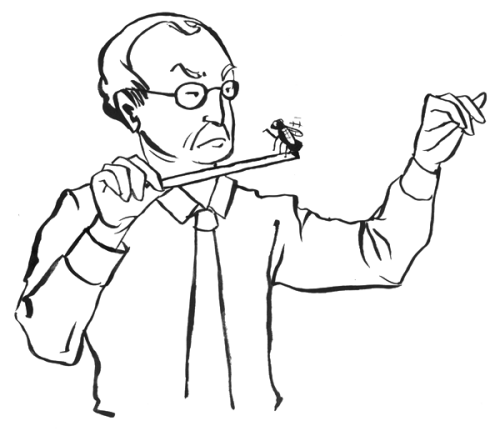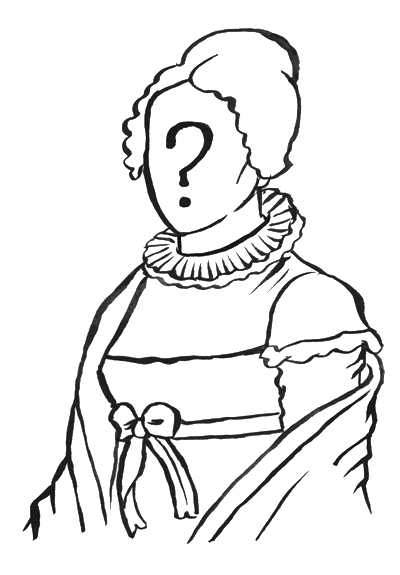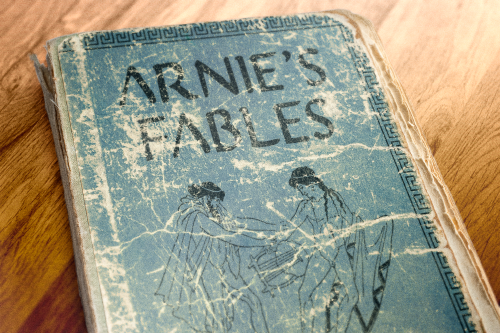
Arnie’s Fables
April 1, 2015
Aesop’s Fables are known throughout the world. Aesop is said to have been a Phrygian slave who lived in ancient Greece and whose fables have endured because of the great wisdom embedded in them. Legend has it that Aesop’s life ended when he either jumped or was thrown from a cliff.
Sadly, another set of highly instructive fables—these tales with musicians in mind, known as Arnie’s Fables, is almost completely unknown to the musical community. As a public service, we offer several of Arnie’s most meaningful fables below:

“The Fly and the Conductor”
A fly landed on Fabio Fabuloso’s baton while he was conducting the Mozart Requiem. As the work approached its end, the fly grew restless and asked the conductor permission to move on. Fabuloso, in the midst of the poignant Lachrymosa movement, answered, “I didn’t notice when you came and I shall not notice when you go.” “That may be,” responded the fly, a bit miffed, “but, by the way, your tempo for the Lachrymosa feels ponderous and in my opinion is much too slow.”
Moral: Every performance has a critic in the audience.
“The Three Architects”
The Indian city of Kasha Varnishka asked three of its most distinguished architects to submit plans for a new concert hall. The first architect favored wood for the warm sound it created. The second architect suggested plaster for its resonant acoustical qualities. The third architect proposed a newly created synthetic material, mershmallow, which combined the best qualities of both wood and plaster. The three architects left the planning committee meeting convinced that one of their brilliant visions would be accepted. None of the architects was ever contacted, however, and the concert hall was never built.
Moral: Who needs a concert hall when we have MP3 players?

“The Two Oboists”
Two oboists, Ferrucio Falgiatori and Gaspar de la Nuit, roomed together during their last year of music school. Ferrucio practiced every day in preparation for orchestra auditions. Gaspar, on the other hand, hardly touched his instrument and was out each night partying. After graduation, Ferrucio failed to get a job but learned to play poker well enough between auditions to win a fortune in Las Vegas. And Gaspar met Talula at a singles bar, married her, and was soon earning a handsome six-figure salary in her father’s high-powered brokerage firm.
Moral: There’s real money in playing the oboe.
“The String Quartet and the String Quartet”
The “Four on the Floor” string quartet set about rehearsing Beethoven’s Opus 131 String Quartet in C Sharp Minor for the very first time. No sooner had Zoltan Voltan, the first violinist, played the opening fugal statement, then second violinist, Desirée de la Touche, complained that his Sforzando was much too jagged. Violist, Tandalaya Goldfarb (who secretly planned to leave the quartet and pursue a solo career under the stage name of Fatima Stromboli) griped that Desiree’s Sforzando in the next fugal statement didn’t match Zoltan’s, like it or not. Then both Zoltan and Desirée charged Tandalaya with grandstanding during her fugal entry. “This is Beethoven, not a Hungarian Czardas,” snickered Zoltan. “Fugal that,” Tandalaya muttered under her breath.
Finally, the last fugal entrance played by cellist Paulo Arpeggioni, was greeted by unanimous disdain. “Out of tune,” said Zoltan smugly. “Poor intonation,” added Desirée. “Utterly lacking in emotional depth,” observed Tandalaya coolly.
At rehearsal’s end, Zoltan was depressed, Desirée had a stomachache, Tandalaya suffered from shoulder and neck spasms, and Paulo was thinking about giving up the cello.
Moral: Never begin work on a late Beethoven quartet without a labor mediator, a psychiatrist, a doctor, a spiritual advisor, and a physical therapist on hand. Also, chicken soup wouldn’t hurt.
“The Date”
Clotilde met Cosmo on line. Cosmo described little about himself in his profile, but a poem he wrote intrigued her:
Oh my,
not too high,
or it won’t fly.
Sigh
But too low?
Oh no.
That won’t flow.
Woah!
But in between,
with a certain sheen,
now that could be keen.
See what I mean?
There was something unusual, even whimsical, if a bit odd about the poem that intrigued Clotilde enough to go on a date with Cosmo.
Clotilde imagined that Cosmo was dashing, wealthy, and wrote his poetry on the back of gourmet restaurant menus while fine French wine was being served. To her great disappointment, however, it turned out that Cosmo was not wealthy, ate only organic foods, and believed in global warming.
Moral: There is always the chance that your date may play the viola.

“Für Elise”
Musicologists from all over the world gathered recently in the picturesque Austrian spa town of Bad Bad to discuss the lingering doubts about Beethoven’s well-known piano work Für Elise. Some suggested that Elise was not the real name of the woman to whom Beethoven dedicated the piece. One musicologist maintained that her first name really was Therese. Another said it was Elisabeth, while a third insisted it was Juliane. The convention ended in disarray without agreement and with much hard feeling.
Moral: Never second guess the great Ludwig van Beethoven. It really was Elise he wrote it für.
“The Singer in the Shower”
Everyone knew that Penelope Parmigiano was a terrible singer except Penelope herself. That’s because Penelope only sang in the shower, where her puny voice was amplified and beautified no end. Every day she looked forward to singing famous arias from the opera repertoire while showering, and with each day her own assessment of her vocal gifts grew. She began to imagine her name, Penelope Parmigiano, on the marquee, with her, Parmigiano, already a big cheese in the opera world.
At last, Penelope could stand it no longer and rented Carnegie Hall for her debut recital. Somehow, word got out just how bad Penelope was, and she walked out on stage to a packed hall with critics from the leading papers in attendance, all of whom regarded her concert as a sly spoof on lieder recitals.
Her concert was an enormous success and led to annual Carnegie concerts for the rest of her life.
Moral: Daily showers are more important than you think.
Little is known about Arnie, the author of these wise and timely fables. Arnie did play the violin, and like Aesop, it has been said that he came to a bad end.
In his later years, Arnie began to get out of breath playing in the violin’s upper registers. His doctor warned him not to go above the fifth position any longer, but Arnie refused to listen. One day, playing first violin in the first ending of the first movement of Mendelssohn’s Octet, Arnie attempted to reach for the very high E flat, became dizzy, and fell off the fingerboard—never to be seen again.
Conspiracy buffs are convinced that Arnie did not fall off the fingerboard, but was pushed.

Subscribe
Sign up to receive new stories straight to your inbox!





































































































































































Comments
Two wandering minstrels were concerned about what had happened to Arnie. As they traveled toward Manhattan, they speculated lengthily about the meaning of his sudden disappearance. The one called Coco insisted he had taken a brief leave to become a composer. “His imagination is boundless, you know, and he was always having to play these tiresome pieces by Bach and Shubert.” “No no”, said his companion. “It wasn’t frustration; he’s struck out on his own to find a bigger Audience. A little Royal recognition at last.!”
The five members of the Washing Squares Very Amateur String Quartet grew weary of their ensemble never being quite together.Key changes would be taken at different times, the violinists could be found be accelerandoing while the violist would be rallentandoing, as violists are wont to do. Never could they agree on repeats; two of the members would take them, three would not see fit to play something again they had already played. The French third violin of the quartet, Monsieur Esprit Savant, came up with a brilliant idea: a musical GPS! The GPS is put on each musician’s stand, if he can stand it. It tells him: “your attention please: in four bars we will all-and I mean all- be modulating to E major; that’s 4 sharps, in case you don’t know.” Another example: “First ending; go back to letter A; first ending; go back to letter A, you fool!” Since they acquired Mr. Savant’s brilliant invention, the Washington Square’s ensemble playing has never shown such togetherness and unlike Mr. Aesop, they no longer fall off cliffs.
Hello Arnold – Your stories are great, really. You should stop all the violin foolishness and get serious with your life, and become a writer. The pay is miserable, the hours long and there is little recognition of true talent like yours. Ask one of your friends to make a movie called Arnies Fables, however, and you could get rich.
Dear Arnie, I’ve read many fables before, but these will be some of my favorites. Love,
Maru
This content is by far the best I’ve read on the Internet to date. Your first paragraph drew me in just by the way it looked. You are very talented and I hope you continue.
Leave a Comment
*/